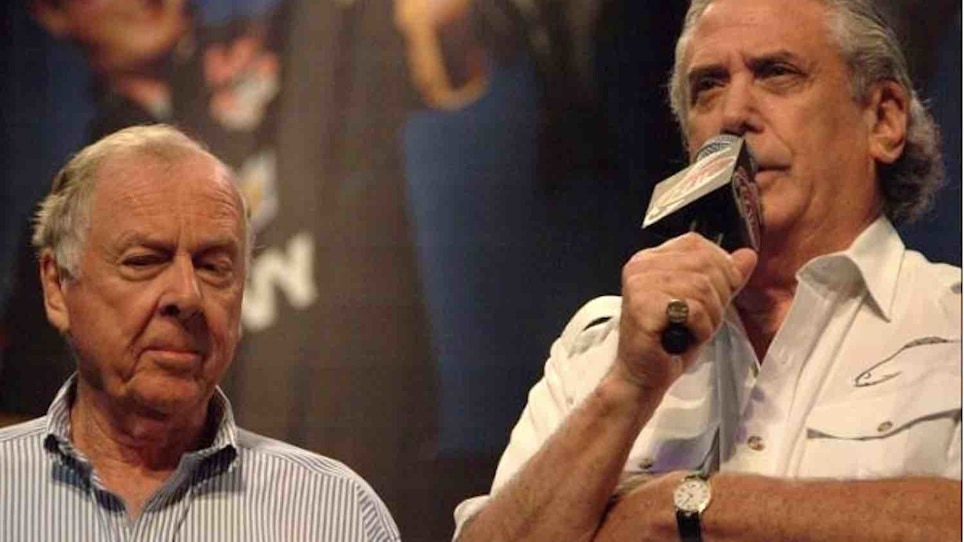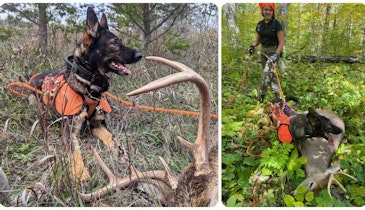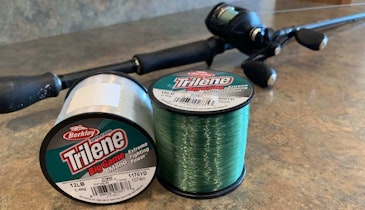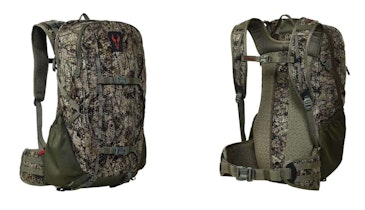
Irwin Jacobs introduces T. Boone Pickens during the 2010 Forrest Wood Cup bass tournament in Atlanta. Jacobs and his wife were found dead April 10, 2019, in their Minnesota home. (Photo: FLW Outdoors)
Irwin Jacobs, the hard-nosed Wall Street corporate investor whose purchase of Ranger Boats and the FLW Outdoors professional fishing organization helped invigorate the bass fishing industry, was found dead April 10 alongside his wife in the bedroom of their Minnesota home.
Jacobs, 77, and his wife, Alexandra, were found unresponsive in their bed by an unidentified person, who contacted police about 8:30 a.m. The Jacobses lived in Orono, a suburb of Minneapolis. First responders with the Orono Police Department, Hennepin County Sheriff's Department and Hennepin County Medical Examiner are investigating.
A gun was found on the bed. Law enforcement searched the home for possible intruders. No one was found. Police announced there was no threat to the public.
The Minneapolis Star-Tribune reported that Dennis Mathisen, a longtime business associate of Jacobs and "very dear friend," said Jacobs killed his wife and himself. Mathisen said he learned the information from Jacobs' son, Mark, and Jacobs' secretary. The newspaper reported Mathisen said Alexandra Jacobs “had been in a wheelchair for the last year or so and had signs of dementia. Irwin was just distraught over her condition.”
Jacobs was a driven, shrewd investor and entrepreneur, known as "Irv the Liquidator" during his heady run as a Wall Street corporate raider in the 1970s and '80s. His tactic of buying distressed companies and liquidating them to maximize whatever profits could be obtained proved fruitful several times over. Jacobs owned and liquidated the Midwest's iconic Grain Belt beer company in the 1970s, owned a minority stake in the NFL's Minnesota Vikings from 1980-91, and for 40 years has owned the J. R. Watkins Co. household and personal care products company. Jacobs also owned Jacobs Trading Co., which specializes in liquidating merchandise. The companies are now managed by his son, Mark.
FLW Outdoors
In the 1990s, Jacobs purchased the iconic Ranger Boats of Flippin, Ark., and the Kentucky-based Operation Bass fishing company. He renamed the latter FLW Outdoors and steered the company to grassroots, mid-level and top tour professional bass fishing tournament serieses that featured Ranger Boats along with other non-endemic sponsors via a longtime partnership with Wal-Mart.
Jacobs was bold, brash and upset the apple cart of the staid, conservative bass fishing world. His three tournament circuits saw increases in prize payouts and opportunities to fish via expansion. The FLW Tour, its top professional series, instituted unbending rules about how anglers could promote their personal sponsors on the final "tv days" of the tournaments; those rules in some fashion eventually made their way into the lower circuits.
He also went head-to-head with Ray Scott, founder of the Bass Anglers Sportsman Society and a similarly driven, headstrong businessman. The bass tournament scene had, essentially, two alpha males in the ring eyeing each other warily, trading shots publicly and behind the scenes, with both companies making changes that upended the fishing, boating and media markets. Those changes still resonate. For about a decade it was, at times, incredible theatre. When, in the early 2000s, BASS was purchased by ESPN it ramped up the drama even more, with Jacobs guiding FLW to a $1 million payout for the winner of the Forrest Wood Cup along with other incentive programs, media coverage and more.
By the late 2000s, Jacobs had begun shifting responsiblities for FLW Outdoors to his daughter, Tricia, and her capable staff. She has been president of marketing since 2010. When the recession hit in 2008, the freshwater and saltwater fishing industry took a hit as consumers tightened their belts. From buying fewer goods and boats to tournament registrations seeing a decline, it took a huge toll. Jacobs' boat company, Genmar Holdings Co., which at one time had 16 brands and more than 400 models of boats, went through a long bankrupcy restructuring beginning in 2009. That was just eight years after its greatest success, with about 7,000 employees and sales of about $1 billion.
Jacobs and his wife had five children.





